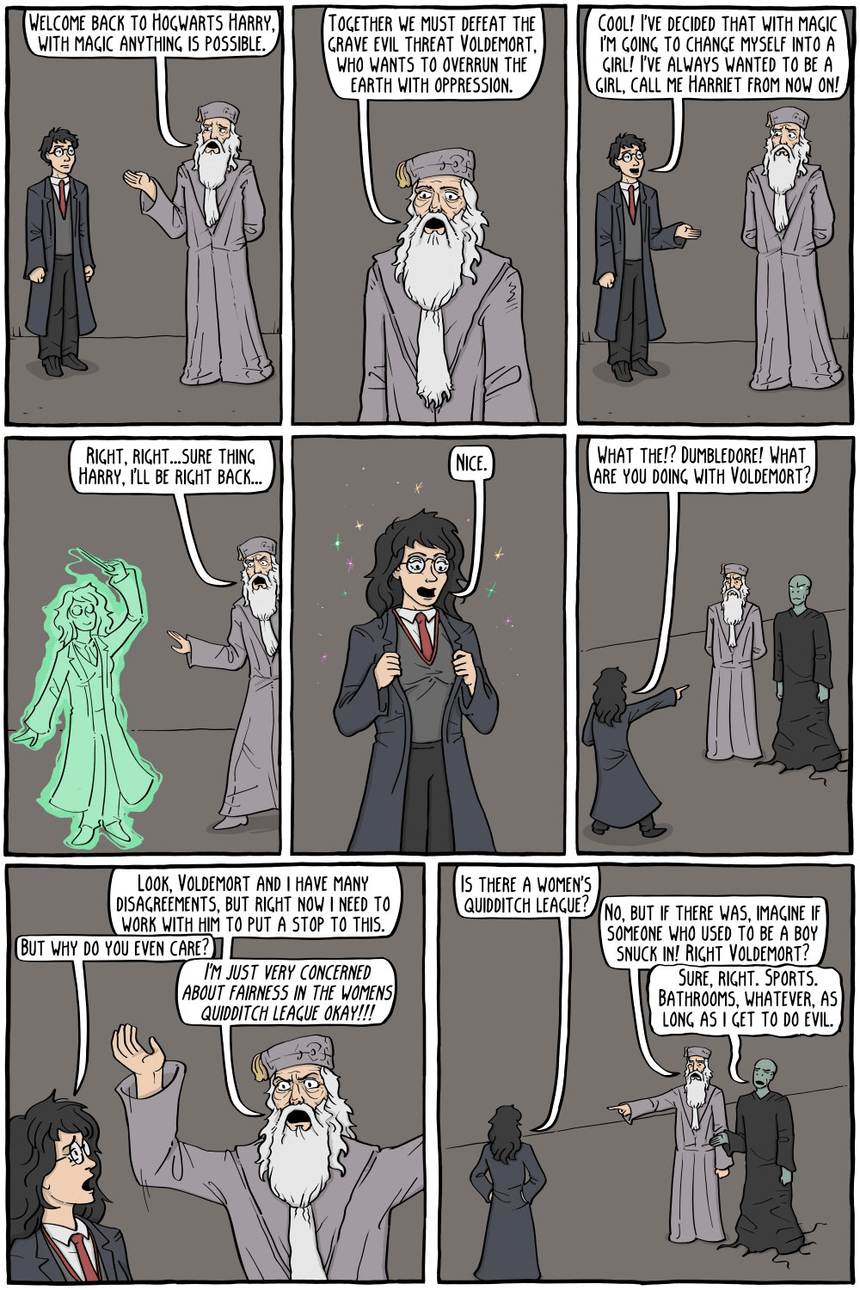CSotD: Sunday Comics Section
Skip to comments
Mr. Boffo reminds me of when I got a subscription to the New Yorker for donating to my NPR station. I enjoyed leafing through and looking at the cartoons, but, while the articles were well-written and interesting, I couldn’t plow through them before another issue arrived.
It was like some literary form of the Sorceror’s Apprentice: Half-read and unread issues piled up, and after awhile it felt more like homework than fun. When it was time to renew, I didn’t.
I don’t have any great point to make, and I still touch base with their cartoons regularly, though the selection since Bob Mankoff left is somewhat less to my taste. I saw Mankoff at Bennington shortly after he departed, together with a large selection of New Yorker cartoons from his time in the editor’s chair, and you might find that link worth clicking.
Though it will indeed add to your reading for the day.

Existential Comics takes a poke at JK Rowling, whose transphobic statements have alienated a number of Harry Potter fans.
On one level, art should remain separate from the artist, and you should, for example, be able to appreciate Byron’s poetry without being distracted by his objectionable personality, which isn’t reflected in his work.
By contrast, Woody Allen’s Manhattan is practically a confession about his sexual fascination for very young women, which turns a wonderfully photographed movie into a ghastly 90-minute cringe, but that shouldn’t stop you from enjoying Annie Hall.
Unless it does.
And looking back at Harry Potter, I don’t see any evidence of transphobia in it, but I know a couple of little girls who used to be little boys, and, while your mileage may vary, my question for Rowling would be why she couldn’t have simply kept her big mouth shut.
Existential Comics nails the point well by showing Dumbledore upset over a problem that exists only in his mind, similar to blowing up a very atypical situation in the form of a swimmer who only transitioned halfway through college into a major crisis. It’s equally foolish and unfair, given that my young friends realized their dysphoria well before puberty and it was neither a momentary fad nor a light decision.
Regardless of what people may think who would rather blather than listen.
My hope is that, when they’re my age, they’ll look back at the lynch mobs of this era and struggle to explain it to the young people of that one.

Speaking of being my age — and lightening the conversation up considerably — Betty (AMS) reminds me of visiting my mother at about the time of her 80th birthday. We were fixing dinner when she moved something on the counter and we heard the clink of a falling coin.
She looked down and saw it was a nickel, then shrugged and said it would have to stay there until something more valuable joined it. She just turned 98 the other day, and now I’m the one adjusting to a life of non-toe-touching and of leaving nickels on the floor.


Between Friends (KFS) takes me back a little further, as Susan had coffee with her old boss and has decided to keep it that way.
When my dad was 50, he decided he was fed up with the steel industry and became a labor negotiator for a large school board, putting his industrial experience into education, something he cared about a great deal more. And while he was assuming what could have been a “bad guy” position, he got along very well with the various unions in the district.
It’s never too late to change, and don’t fool yourself: The days of 40 years and a gold watch are over.
If you want gratitude, adopt a dog.
Juxtaposition of the Day


Pooch Cafe didn’t faze me, since I’m used to the idea that most people these days live in the city and look with horror at the prospect of sleeping on the ground in the presence of animals.
It’s a trade-off of sorts, since most of us country folk are pretty sure that going into the city will result in a mugging or worse, though I’ll say it’s a whole lot easier to find a city person who has been mugged than it is to find a country person who has been attacked by a bear.
However, while I shrug off the litany of complaints about mosquitos and dirt and rain and such, the Flying McCoys took pastorophobia to a whole other level.
I have terrific memories of fishing with my dad, and my kids have great memories of fishing with me. We didn’t always bring home dinner, or even a snack, but we had a lot of time to talk between tossing back the little ones and baiting the hook again.
If hanging out with your dad is traumatic, don’t blame the fish.
In fact, when Jan Eliot was semi-retiring and packing up her Stone Soup archives, she asked me if I’d like an original, and I knew exactly which one I wanted. This piece from 2012 is now hanging over my desk:

You never know what’s going to stick, and, while you can’t avoid an occasional clinker, it’s well worth the effort to outfit your kids with as many good memories as you can. What’s great about this strip is that Alix has more memories that her mother and aunt expect, and the guide at the aquarium doesn’t realize the depths from which they come.
Maybe Alix doesn’t know where her knowledge comes from, either, but there’s a level on which she remembers, however imperfectly, that her father loved her and did things with her.
And, by the way, if you prefer to view nature through the windshield of a car, leaf-peeping season is approaching, and here’s an interactive map from the folks in the Smoky Mountains to help plan a trip.

There’s not much yet, but it’s early.

Here’s the prediction for Columbus Day, which is usually good in the Northern Forest, after which a lot of the tourist places shut down for the winter.
Meanwhile, it’s still warm enough for a little kayaking with Dad, as this Canadian film shows:
Comments 15
Comments are closed.